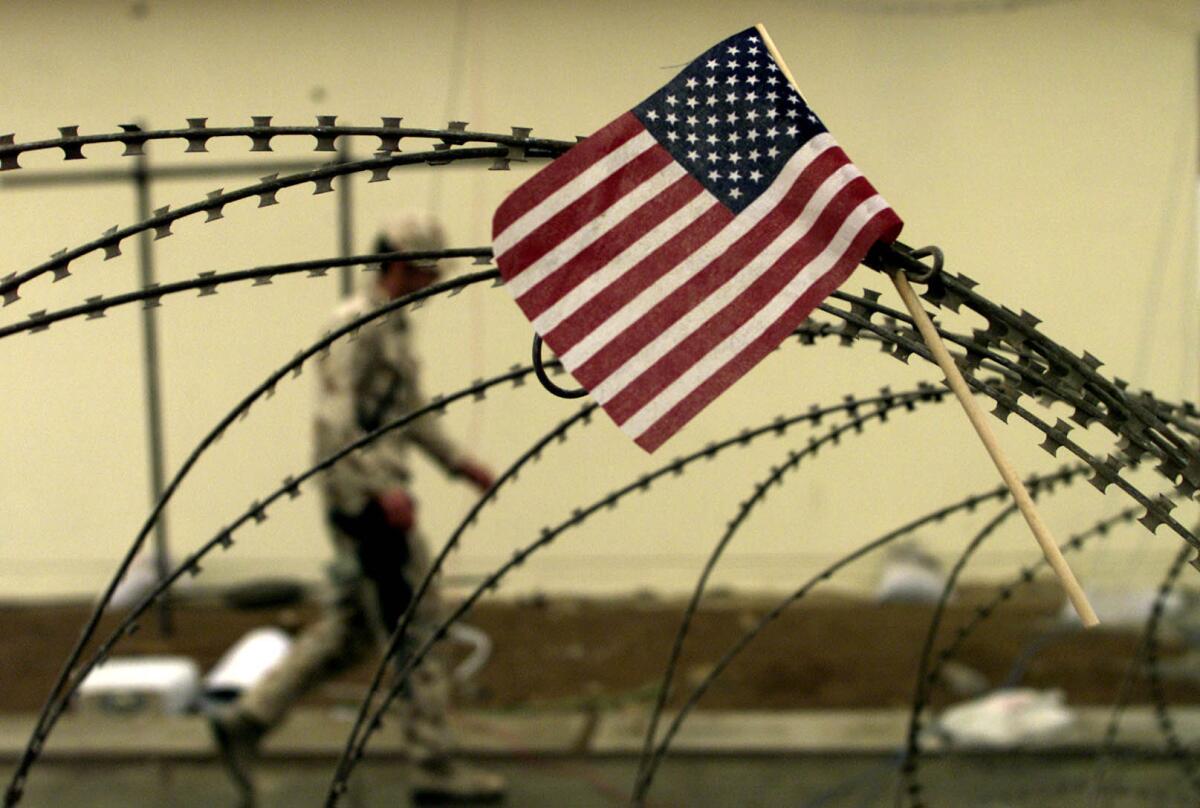Opinion: What it felt like when the Afghanistan war started in 2001

- Share via
It’s safe to say most Americans who were alive on Sept. 11, 2001, remember precisely what they were doing the moment they heard New York and the Pentagon had been attacked. Less certain is whether many of us have a similarly clear recollection of the following Oct. 7, when U.S. planes began bombing Afghanistan, starting a war that would last nearly 20 years and cost vastly more lives and resources than the terrorist attacks that spawned it.
I remember where I was: in my college dorm on a Sunday, on the phone with my mother (no iPhone alerts in those days). World-changing as many of us knew the war would be, at the time it felt like yet one more grim alteration of our reality among many — the armed National Guardsmen in fatigues patrolling airports, the terrifying spike in anti-Muslim hate, the agitation for revenge against Al Qaeda and the Taliban, and now a war. The attack on Afghanistan, unimaginable a month prior, felt oddly ordinary when it happened.
Now, almost 20 years later, President Biden has declared it is time to end America’s longest war and is saying that U.S. forces will be withdrawn starting May 1, and completely by Sept. 11 — 20 years after the 9/11 attacks. Where were you and what you were doing when the war began? Did you serve in Afghanistan or have loved ones who did? Please write to us at [email protected].
——————————————
To the editor: It is way past time for the U.S. to remove its military forces from Afghanistan. The Biden administration’s plan to complete withdrawal on the 20th anniversary of Sept. 11 is a great way to file the date in our communal memory, to say nothing of the history books.
However, the Taliban, which ruled Afghanistan before being overthrown after the U.S. invasion in 2001, is under control now because we still have troops in the country. After we leave, what will become of the women and girls who have been their victims for decades?
My personal hope is that a “lasting peace” includes a humanitarian presence to stand up for women and give them the safe space they will desperately need.
Joan Walston, Santa Monica
..
To the editor: Are we any safer from terrorism today than we were 20 years ago because of our actions in Afghanistan? Our military presence has not created a lasting peace. It has cost lives and tax dollars.
The world won’t become a safer place until we support peace building, diplomacy and collaboration in order to prevent violent conflict. We would do better to invest in equitable education, sustainable energy, healthcare and systemic justice rather than to finance endless military action.
Isn’t that true national security?
Susan Anderson, Laguna Beach
..
To the editor: I was a witness to our abandonment of South Vietnam as a ground pounder and in Iraq as a advisor to the U.S. military.
We should not leave the Afghans until their government is no longer corrupt and the garbage is picked up on a routine basis. Short of these goals, we will lose again.
John Everett, Agoura Hills
..
To the editor: The concerns of people objecting to the withdrawal of U.S. forces from Afghanistan are as old as stale bread.
In October 2001, if President George W. Bush had declared that we were pursuing Osama bin Laden into the Afghan countryside and that we would commit to a U.S. presence for 20 years, I seriously doubt that Americans would have supported such idiocy. The mission was to capture Bin Laden and destroy Al Qaeda, not to build a new nation.
Global empires such as the Soviet Union were dealt serious setbacks by their hubristic ambitions in that hornet’s nest, and the U.S. has fared no better. It is time to exit.
Bob Teigan, Santa Susana
..
To the editor: You do not win guerrilla wars; rather, you decide how long you want to fight them.
Vietnam, Afghanistan and Iraq are all guerrilla wars and variations of civil wars. They are Operation Lost Cause Parts I, II and III.
Angus MacDonald, Culver City
..
To the editor: Biden says it’s time to end the “forever war.” I agree wholeheartedly. But if he only intends to withdraw U.S. troops and doesn’t include contractors and CIA operatives, this will only be a symbolic exercise.
We can’t say we’ve pulled out of Afghanistan just because we pull out U.S. troops. If Biden is serious about ending the forever war, he needs to get Americans out of the country.
Les Hartzman, Los Angeles
More to Read
A cure for the common opinion
Get thought-provoking perspectives with our weekly newsletter.
You may occasionally receive promotional content from the Los Angeles Times.











